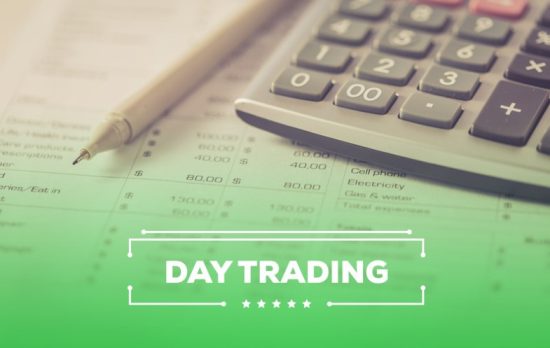Welcome to the exciting world of day trading in Canada! If you have a passion for finance, an appetite for risk, and a desire to take control of your financial future, then day trading might just be the perfect avenue for you. This fast-paced form of trading allows individuals to buy and sell stocks within the same trading day, aiming to profit from short-term price fluctuations.
But how do you get started? In this complete guide, we will walk you through everything you need to know about starting day trading in Canada. From choosing the right broker to understanding the rules and strategies that can help maximize your profits – we’ve got you covered. So buckle up and let’s dive into the thrilling world of Canadian day trading!
What is Day Trading?

What is day trading, you ask? Well, it’s a form of trading where individuals buy and sell financial instruments within the same trading day. Unlike long-term investors who hold onto stocks for months or years, day traders aim to capitalize on short-term price movements.
Day trading involves buying and selling financial instruments within the same trading day to make profits from short-term price movements. It requires knowledge, discipline, and risk management skills to navigate this high-intensity world successfully.
How to Start Day Trading in Canada?
So you’re interested in starting day trading in Canada? That’s a great way to potentially make money from the comfort of your own home. But where do you begin? Here are some steps to get you started on your day trading journey.
- First and foremost, it’s important to educate yourself about what day trading is. Day trading involves buying and selling financial instruments within the same trading day to make small profits through multiple trades. It requires knowledge of market trends, technical analysis, and risk management.
- Once you understand day trading, the next step is to choose a reputable broker. Look for brokers that offer competitive commission rates, user-friendly platforms, and access to different markets. Take into consideration factors such as customer support and educational resources as well.
- Before diving headfirst into day trading, it’s crucial to determine how much capital you can afford to invest. While there is no set minimum amount required by law in Canada, starting with at least CAD 25,000 is generally recommended for pattern-day traders who trade frequently.
- Now that we’ve covered the basics of getting started with day trading in Canada – education, choosing a broker, and determining your investment capital – let’s move on to discussing some rules and regulations that apply specifically in this country.
To engage in pattern (day) trading activities on Canadian exchanges or using Canadian brokers/platforms as an individual trader without being classified as a professional trader under tax laws:
- Ensure that less than 50% of your total annual income comes from securities-related activities.
- Limit your frequency of trades.
- Keep careful documentation of all transactions.
- Be aware that certain exchanges may require specific qualifications or certifications for participation.
Day traders can make money through various strategies such as momentum trading (buying stocks moving strongly upwards), scalping (making quick profits from small price movements), or swing trading (holding positions overnight). However, it’s important to note that day trading also involves risks and losses are a
How to Choose a Broker for Day Trading?

When it comes to day trading in Canada, choosing the right broker is crucial. Your broker will be your gateway to the financial markets, so choosing one that meets your specific needs and preferences is important.
- First and foremost, consider the reputation and reliability of the broker. You want to ensure that they have a solid track record and are regulated by recognized authorities.
- Next, evaluate their trading platform. A user-friendly platform with advanced charting tools can make all the difference in executing trades quickly and efficiently.
- Fees are another factor to consider. Look for transparent pricing structures with competitive commissions and low spreads. Be wary of brokers who charge excessive fees or have hidden costs.
- Customer support is also important. As a day trader, you may need assistance at any time during market hours, so choose a broker that offers responsive customer service through various channels.
- Consider any additional features or services offered by the broker. Some brokers provide educational resources, research tools, or access to different asset classes – these extras can enhance your trading experience.
By carefully considering these factors, you can find a reliable and suitable broker for your day trading activities in Canada
The Minimum Amount Needed to Start Day Trading
When it comes to starting day trading in Canada, many beginners wonder about the minimum amount of money they need to get started. While there is no set requirement, having enough capital is crucial for success in this fast-paced, high-risk endeavour.
- One important factor to consider is the cost per trade. Day traders typically make multiple trades throughout the day, so each transaction can add up quickly. Choosing a broker that offers competitive fees and low commissions is essential.
- Another consideration is the volatility of the market you plan to trade in. Some markets require higher initial investments due to their higher price levels and larger fluctuations. For example, trading stocks may require a larger investment compared to trading currencies or commodities.
- Risk management should also be taken into account when determining your minimum starting amount. As a day trader, you must have sufficient funds for your initial trades and potential losses. Starting with an amount that allows you to comfortably absorb any unexpected downturns without jeopardizing your entire capital is recommended.
- The minimum amount needed will vary depending on factors such as your risk tolerance, trading strategy, and market conditions. It’s advisable to consult with experienced traders or financial advisors who can provide personalized guidance based on your specific circumstances.
The Rules of Day Trading in Canada
Day trading in Canada is subject to specific rules and regulations that traders must adhere to. These rules are designed to protect investors and maintain the integrity of the financial markets. Aspiring day traders need to understand these regulations before getting started.
- One key rule is the requirement for day traders to have a margin account with their brokerage firm. A margin account allows traders to borrow funds from their broker, which can be used for buying and selling securities on the same day. However, it’s essential to note that not all stocks are eligible for day trading on margin.
- Another crucial rule is known as the “pattern day trader” rule. Under this regulation, if you make more than three-day trades within a consecutive five-business-day period, you will be classified as a pattern day trader (PDT). PDTs must maintain an account balance of at least CAD 25,000 throughout the trading session.
- Additionally, Canadian day traders should be aware of certain tax implications associated with their activities. Any profits made through day trading are subject to capital gains taxes, while losses can be used as deductions against other taxable income.
- Canadian day traders need to conduct thorough research on any securities they plan on trading and stay informed about market trends and news events that could impact their positions. Knowledge of both technical and fundamental analysis can enhance your chances of success in this fast-paced field.
- By understanding and following these rules, aspiring day traders in Canada can navigate the markets effectively while minimizing risks associated with non-compliance or lack of knowledge about regulatory requirements.
Strategies for Successful Day Trading in Canada

Having a sound approach is essential while day trading. It’s not just about making quick trades and hoping for the best. Here are some strategies that can help you become a successful day trader in Canada.
- It’s important to have a well-defined trading plan. This means setting clear goals and objectives for your trades. Decide on your risk tolerance and stick to it. Having a plan will help you stay focused and avoid impulsive decisions.
- Another strategy is to do thorough research before entering any trade. Stay updated with market news, analyze charts, and study technical indicators. This will give you valuable insights into potential opportunities or risks.
- Risk management is key in day trading. Set stop-loss orders to limit potential losses, and always be prepared to exit a trade if things don’t go as planned.
- Additionally, many successful day traders use momentum trading strategies. They capitalize on stocks that are experiencing significant price movements or volume surges.
- Learn from your mistakes and adjust your methods accordingly. Keep a record of your successes and failures. Never stop expanding your knowledge of the markets.
Following these strategies’ll increase your chances of success as a day trader in Canada! Remember though, consistency is key – so stay disciplined and patient throughout your journey!
Conclusion
Day trading can be an exciting and potentially lucrative venture in Canada. By following the right steps and understanding the rules and regulations, you can confidently start day trading. To begin your journey as a day trader in Canada, it’s important to understand what day trading is and how it works clearly. Educate yourself on different strategies, tools, and techniques that experienced traders use to make informed decisions.
FAQs on Day Trading in Canada
1. How much do day traders make in Canada?
In Canada, the average trader pay is $117,580 per year or $60.30 per hour. Entry-level salaries begin at $90,370 per year, with the most experienced professionals earning up to $144,386 per year.
2. What is the 30-day rule in stock trading in Canada?
This rule states that investors who claim a capital loss on the sale of an investment may not repurchase the identical investment within 30 days of the sale.
3. Do day traders pay taxes Canada?
If the CRA believes you are a professional day trader, all capital gains will be treated as business income. As a result, you will be taxed on all of your capital gains.
4. Is day trading worth it after taxes?
A successful trader must pay taxes on their earnings, which reduces any possible profit. Furthermore, when compared to long-term buy-and-hold investing, day trading does not qualify for preferential tax treatment.
5. Can I use my TFSA for day trading?
Day trading is not prohibited by the TFSA. However, if you make a lot of money doing it, to the point where you have a multi-million dollar account balance, you might get taxed. The issue is that making a lot of money day trading appears to be a business.











